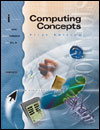 |  I-Series Computing Concepts Stephen Haag,
University of Denver
Maeve Cummings,
Pittsburg State University
Alan I Rea, Jr.,
Western Michigan University
Ethics, Security, And Privacy
Did You KnowWith the widespread use of computers comes enormous power and freedom from drudgery. But, along with that comes a new kind of vulnerability to observation by others. - In March 2000 the Business Week/Harris Poll reported that 57% of the population want the government to pass laws on how personal information is collected.
- The U.S. Federal Trade Commission (FTC) says that 92% of Americans are concerned about misuse of their personal information.
- A Time magazine poll found that 95% of Americans believe that employers should not be allowed to listen in on their employees' phone conversations.
- The lie detector was outlawed in 1988 as a pre-employment screening device because of its notorious inaccuracy.
- The American Management Association found that 78 percent of large US businesses monitor their employees' communications.
- Most hackers are young men aged __ to __.
Most hackers are young men aged 15 to 25. White-hat hackers usually like to think of themselves as an elite troupe seeking the vulnerabilities in computer systems for the good of all. They know that hacking into other people’s computers is illegal, but they think it's ethical because they find security holes and then allow system administrators to fix those problems before anyone with malicious intent tries to get in. |
|




 2002 McGraw-Hill Higher Education
2002 McGraw-Hill Higher Education